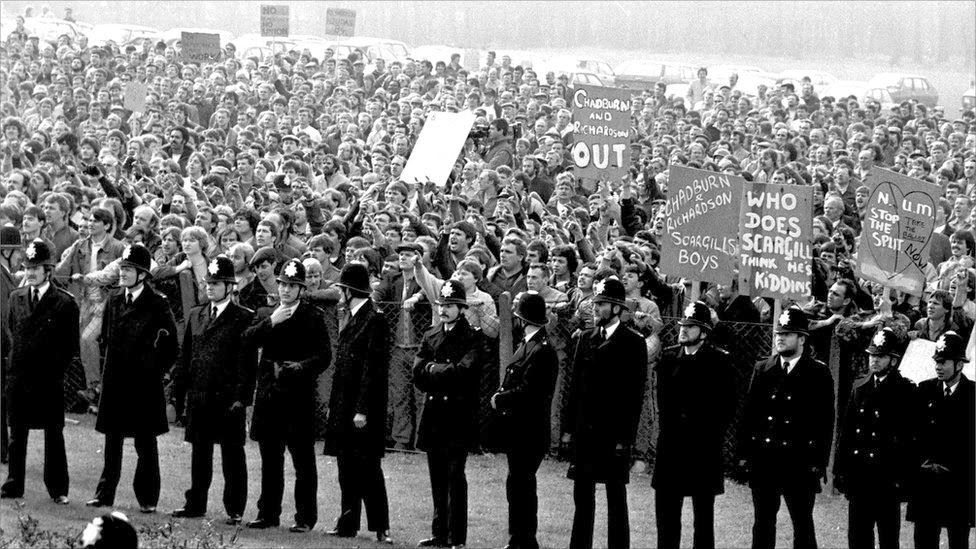Abridged version from the bbc:
http://www.bbc.co.uk/history/british/modern/thatcherism_01.shtml
By Dennis Kavanagh - Last updated 2011-03-03
What was the post-war
political consensus and why did Thatcherism represent its final demise?
Consensus
Britain emerged from the 1939-1945 war triumphant, but economically
exhausted. It was one of the top three superpowers, although in reality a
distant third behind the United States and the Soviet Union. Nonetheless, its
political system and the British state had been vindicated by success in war,
and over the next few years Britain emerged as a model social democracy,
combining planning and collectivism with civil liberties.
The 1945 Labour government was largely responsible for what is called the
'post-war consensus'. However, some of the key elements can trace their origins
to the war-time coalition government and the influence of Liberals like William
Beveridge and the economist John Maynard Keynes.
There was a belief that
government could play a positive role in promoting greater equality through
social engineering.
The major features of domestic politics included:
1. Governments accepted a commitment to maintain full employment by
Keynesian techniques of economic management. Ministers would use their levers,
such as cutting taxes and boosting state spending, to increase the level of
economic activity.
2. Acceptance and some encouragement of the role of the trade unions. In
contrast to the pre-war years, governments recognised and consulted them
regularly on workplace relations and economic policy. The unions’ access to
government was increased partly by full employment and partly by governments
turning, post-1961, to income policies as a way of curbing inflation.
3. The mixed economy, with a large role for state ownership of the
utilities (such as gas, electricity, coal, rail, etc) and intervention and
planning in the economy.
4. The welfare state. The object of the national insurance system and the
National Health Service was to provide an adequate income and free health when
a family’s income was hit by, for example, sickness, old age, unemployment or
death of the main breadwinner. The services were provided out of general
taxation, or insurance, and represented social citizenship.
5. There was a belief that government could play a positive role in
promoting greater equality through social engineering, for example, by
progressive taxation, redistributive welfare spending, comprehensive schooling
and regional policies.
Abroad, the parties agreed on: the transition of the empire to the British
Commonwealth, an association of independent states; British membership of the
North Atlantic Treaty Organisation (Nato); nuclear weapons, (regarded as a mark
of being a major power); and, on balance, that Britain should join the European
Community.
These policies were pursued by both Labour and Conservative governments,
the latter because they thought it was necessary to gain working class support
to win general elections and gain the consent of the major interest groups.
Consensus is not an ideal term because it may be read as suggesting that
there were no differences between the parties. In fact, the above ideas and
policies were often challenged by the left of the Labour party and by the free
market or right wing of the Conservatives. But much of the political elite –
the media, civil service and the leaderships of the parties, particularly when
they were in government - shared many of these ideas.
Economic decline
Picture
left: Prime Minister Edward Heath in 1971 - During the 1960s and 1970s, the
main parties competed to reverse Britain’s relative economic decline. There was
a growing awareness that the economic league tables showed that Britain was at
the wrong end for figures regarding strikes, productivity, inflation, economic
growth and rising living standards.
Virtually all European countries, except for Britain, had so-called
'economic miracles'. Britain was often described as the 'sick man of Europe'.
The targets for blame included: failure to invest in new plant and machinery;
restrictive working practices and outdated attitudes on the shop floor ('us and
them'); amateurish management; loss of markets; and rise of competition.
It seemed that the UK was
ungovernable and that no government had an answer to inflation.
Britain appeared to be the weak link in the international liberal
capitalist economic system, plagued by high inflation, low growth and
irresponsible trade union power.
Governments of both parties turned to incomes policies as an answer to
inflation. They tried to agree a 'norm' for annual wage rises with the unions.
This was always difficult for the unions, for their purpose is collective
bargaining. This policy managed to keep prices down for a time, but collapsed
when powerful groups broke the 'norm'. They failed dramatically with the Edward
Heath government in 1973-1974 and again with the Labour government in 1979.
Measures to boost economic activity and reduce unemployment sucked in extra
imports, thereby worsening the trade balance, and seemed to lead to
unacceptable rises in inflation. The financial markets’ loss of confidence
meant a sharp slide in the value of sterling, which in turn led to the
International Monetary Fund's 'rescue' in 1976. The IMF granted a loan to the
British government in return for spending cuts and continued anti-inflation
policies. That this happened at a time of high unemployment seemed to signal
the end of the era of following Keynesian economic policies.
The 'Winter of Discontent' in 1979 was a key event. The rash of strikes in
crucial public services against the Labour government’s income policies seemed
to show that the country was ungovernable and that no government had an answer
to inflation. It destroyed the government’s reputation for prudent economic
management and its ability to gain the cooperation of the unions.
Just as the Heath government had come to grief following the miners’
damaging strike against its incomes policy and subsequently lost the February
1974 general election, so the Labour government lost office in 1979 on pretty
similar grounds.
There were two responses to this failure. From the right, the new ideas of
economists Friedrich Hayek and Milton Friedman - advocating monetarism, a
greater scope for markets and limited government - won out over the ideas of
the left for more state ownership and protection of industry following a
withdrawal from the European Community.
Thatcherism
Picture
left: Margaret Thatcher at the Conservative conference in 1982 - Much of
so-called Thatcherism actually evolved as circumstances allowed, and was helped
by the failures of the opposition. For example, privatisation, a flagship
policy, was not mentioned in the 1979 manifesto.
At the 1983 general election, in spite of unemployment doubling to some
three million, the government won a landslide victory thanks in large part to
Labour’s divisions and its left-wing policies.
Thatcher’s government insisted
that it could no longer be a universal provider.
It is interesting to consider the fate in the 1980s of the five features of
the post-war consensus outlined previously.
1. Trade unions now operated in a tighter legal framework, including: the
requirement for pre-strike ballots; the end of the 'closed shop' (union
membership as a precondition of employment in a specific industry); and making
unions liable for damages incurred in illegal strikes. They were hardly
consulted by the government and their influence waned in part because of the
abandonment of income policies and rising unemployment.
2. The spread of privatisation of the major utilities altered the balance
of the mixed economy. Gas, electricity, telephony, British Airways and later
British Rail were all privatised. There was also a huge sale to tenants of
council housing.
3. The government abandoned its commitment to full employment, stating this
was the responsibility of employers and employees, and accorded priority
instead to keeping inflation low.
4. Welfare state benefits were increasingly subject to means-testing.
5. Government insisted that it could no longer be a universal provider.
More should be left to the market, the voluntary sector and self-help.
Thatcher's
mandate
Picture left: Striking miners clash with police in
Wooley, Yorkshire, 1984 - There was no great endorsement of Thatcherism in
1979. As late as October 1978, Labour was still ahead in some opinion polls,
but the 'Winter of Discontent' turned the public against Labour and the unions.
The election was more of a rejection of Labour than an endorsement of
Thatcherism.
The recapture of the Falkland Islands from Argentina in 1982 was important
for the success of the Thatcher’s project. It coincided with an improvement in
the public standing of the government and of Thatcher herself. The victory
seemed to vindicate her claims in domestic politics that she could provide
strong leadership and stand up for the nation. The war rhetoric could now be
turned against the enemies within - particularly the trade unions.
There are academic disputes about the extent to which military success
boosted Conservative chances in the 1983 election. There were signs of a
revival in the polls and greater economic optimism even before the capture. But
what if the Falklands had been lost? Would the government have survived?
Labour could not exploit
dissatisfaction, because it was seen as weak and divided.
Thatcher was respected but not liked by the British public. For all the
talk of sweeping election successes, government only gained an average of 42%
of the vote at general elections. But the peculiarities of the British
electoral system and the split of the non-Conservative vote between the Labour
and Liberal-Alliance parties meant that the government was able to win over 60%
of seats in the House of Commons.
Surveys showed limited support for many of Thatcher’s values. Professor
Ivor Crewe’s 'The Crusade that Failed' noted the lack of support for Thatcher’s
policies on 'tax-and-spend' and replacing the dependency culture with an
enterprise culture. And there was greater approval for a more equal society and
for social and collective provision of welfare as against Thatcher's vision of
people looking after themselves.
But Labour could not exploit this dissatisfaction, because it was not
trusted on the economy or defence and was widely seen as weak and divided.
Labour conversion
Successive heavy general election defeats gradually convinced Labour to accept
much of the new settlement. From outright repudiation of the policies at the
1983 general election, Labour steadily came to accept successive tranches of
Thatcher's policies.
Labour accepted the need to prioritise economic stability and encourage
private enterprise.
Some of these policies, including sales of cheap shares in privatising
utilities, cutting direct taxes, and trade union reforms, were widely popular.
Globalisation also meant that there were international pressures for
national governments to pursue ‘prudent’ economic policies. Labour gradually
accepted the need to prioritise economic stability, low inflation and
borrowing, and encourage private enterprise.
In addition, de-industrialisation and the decline of the working class and
trade union membership meant that Labour’s traditional electoral base was being
eroded. Gaining the support of an increasingly middle class electorate was
crucial for electoral victory as Britain underwent demographic and economic
change.









